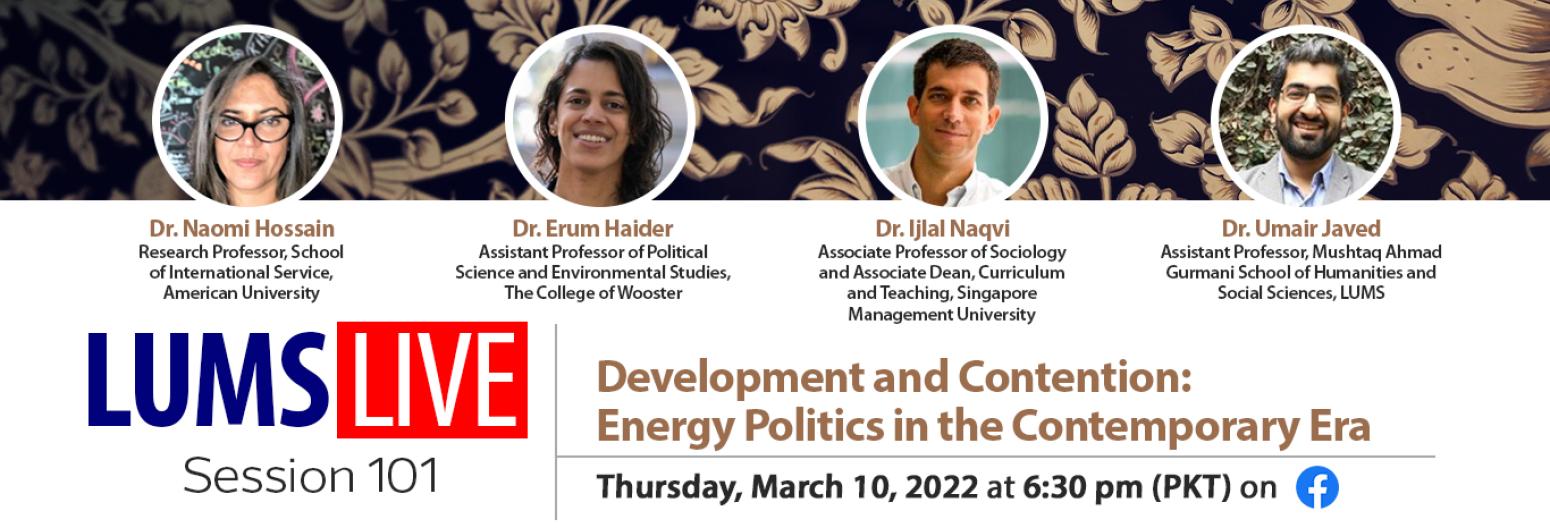
March 10, 2022
The preceding two decades have been characterised by the emergence of considerable protest and contention around issues of energy access. Riots, protests, sit-ins, and other forms of mobilisation are frequent occurrences in response to energy pricing, access, and availability in both the Global North and South. The literature around energy is dominated by technocratic and economistic approaches, pertaining to the creation of more efficient energy markets and resolving bottlenecks in development agendas. However, there is a need to garner a more holistic perspective on energy that relates it to the lived reality of citizens across the world.
This panel brings together academics who study energy from a social scientific perspective, reflecting on the centrality of energy in political and social life and what that tells us about state-society relations in the 21st century.
Hosted in collaboration with the Mahbub ul Haq Research Centre (MHRC) as part of their Political Economy of Development Series, the session will be moderated by Dr. Umair Javed.
Join us for this interesting conversation!
About the Panelists
Dr. Naomi Hossain
Dr. Hossain is a Senior Research Fellow at the Institute of Development Studies (IDS), and a former employee of BRAC in Bangladesh. Her work focuses on accountability for disasters and crises, such as food and energy price shocks, ‘natural’ disasters, and industrial accidents, and on the role of protest in holding public authorities to account. She acts as an advisor to multilateral agencies, governments, NGOs and research institutions. One of her recent books is The Politics of Education in Developing Countries (2019; Oxford University Press). Dr. Hossain received her BA (Hons) degree from the University of Oxford, MSc from the London School of Economics and Political Science, and PhD from the University of Sussex.
Dr. Erum Haider
Dr. Haider is a recipient of the USIP Jennings Randolph Peace Scholar pre-doctoral fellowship for 2019-20. She is also a Research Fellow at the Mahbub ul Haq Research Center (MHRC). She studies the privatisation of public goods and her doctoral research and book project examine the ability of citizens to use political representatives to lobby for better provision. Her research primarily takes place in Karachi, Pakistan. Dr. Haider received her BA degree from LUMS, MA from University of Chicago, and PhD from Georgetown University.
Dr. Ijlal Naqvi
Dr. Naqvi is a sociologist of development with interests in political sociology and urban studies. His research interests include political sociology, international development, Muslim-majority countries, and electrical power. His book Access to Power: Electricity and the Infrastructural State in Pakistan uses the electrical power infrastructure in Pakistan as a lens on questions of uneven state capacity in the Global South. Dr. Naqvi received his BA (Economics) from Middlebury College, MALD from Tufts University, and PhD (Sociology) from University of North Carolina.
Dr. Umair Javed
Dr. Javed’s research interests span various aspects of political participation, socio-economic development, and urban public life in South Asia. His academic work has been published in Economic and Political Weekly, Current History, and Catalyst: A Journal of Theory and Strategy. His research and political analysis has been featured by a number of international print and electronic media outlets, including BBC, Sky News, The Guardian, Al Jazeera, The Economist, and the Washington Post. He completed his PhD at the London School of Economics and Political Science (LSE) in 2018, where he was a recipient of the LSE Centennial PhD Studentship.



















